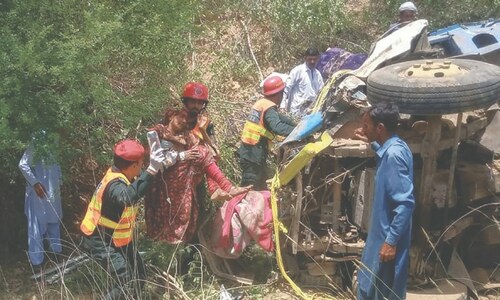WASHINGTON, Sept 13: A US non-proliferation group has urged the Bush administration to ensure that its civil nuclear trade with India does not in any way assist or encourage the country’s nuclear weapons programme.
This and other suggestions by the Arms Control Association, an umbrella organisation representing influential non-proliferation lobbyists, are backed by 16 former US officials and experts.
The Indo-US nuclear deal comes up for hearing at the US Senate later this month. The House of Representatives has already approved the deal.
The ACA said that the suggestions, sent in a letter to the Senate on Tuesday, seek to remedy ‘serious flaws’ in the US-India nuclear deal. The group is also seeking to “further offset the adverse effects of the arrangement on US non-proliferation and security objectives.”
India has already expressed reservations with both the enabling legislation passed by the House of Representatives and the draft bill approved by the Senate Foreign Relations committee. It is unlikely to accept further restrictions.
But the experts who signed the ACA letter are encouraging lawmakers to adopt and uphold measures that they say are essential for US security and non-proliferation.
The ACA has also urged the Senate to prohibit the US government from continuing nuclear assistance or facilitating foreign nuclear exports to India if the Indian government or Indian entities break existing non-proliferation commitments and practices.
Yet another suggestion is to restrict full US nuclear trade until India joins the five original nuclear-weapon states in stopping the production of fissile material (plutonium and highly enriched uranium) for weapons or subscribes to a multilateral fissile production cut-off agreement.
“We believe these measures are necessary because India has neither joined the Nuclear Non-proliferation Treaty, nor accepted safeguards on all of its nuclear facilities, and India’s non-proliferation policy is not fully consistent with the non-proliferation practices and responsibilities expected of the original nuclear-weapon states,” the letter said.
The experts who signed the letter noted that as part of the proposed deal, India has pledged to accept safeguards on only eight additional “civilian” nuclear facilities by 2014, while current and future military-related nuclear reactors, enrichment and reprocessing plants and weapons fabrication facilities would remain un-safeguarded.
Such ‘partial’ IAEA safeguards would do nothing to prevent the continued production of fissile material for weapons in un-safeguarded facilities, they said.















































Dear visitor, the comments section is undergoing an overhaul and will return soon.